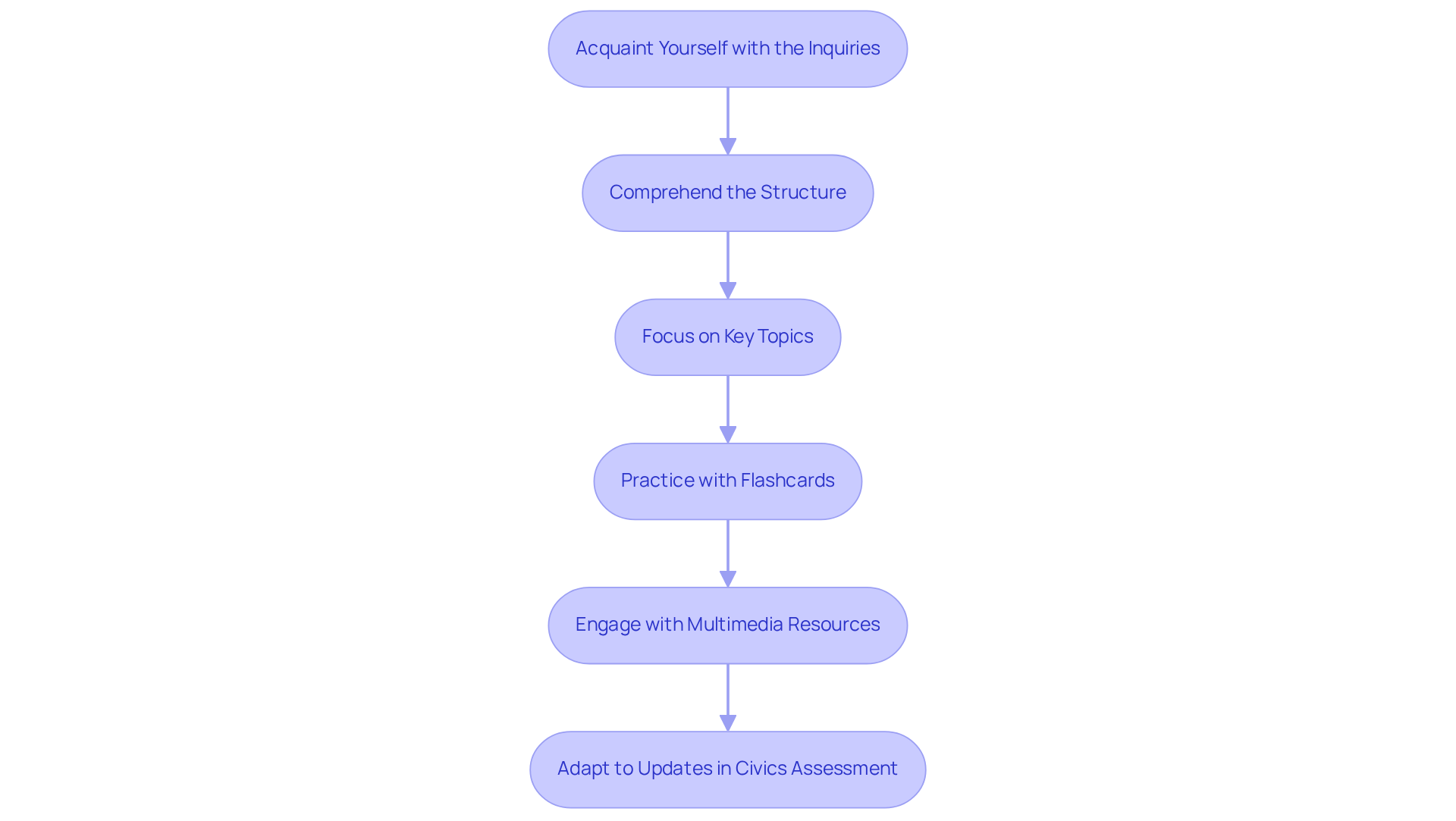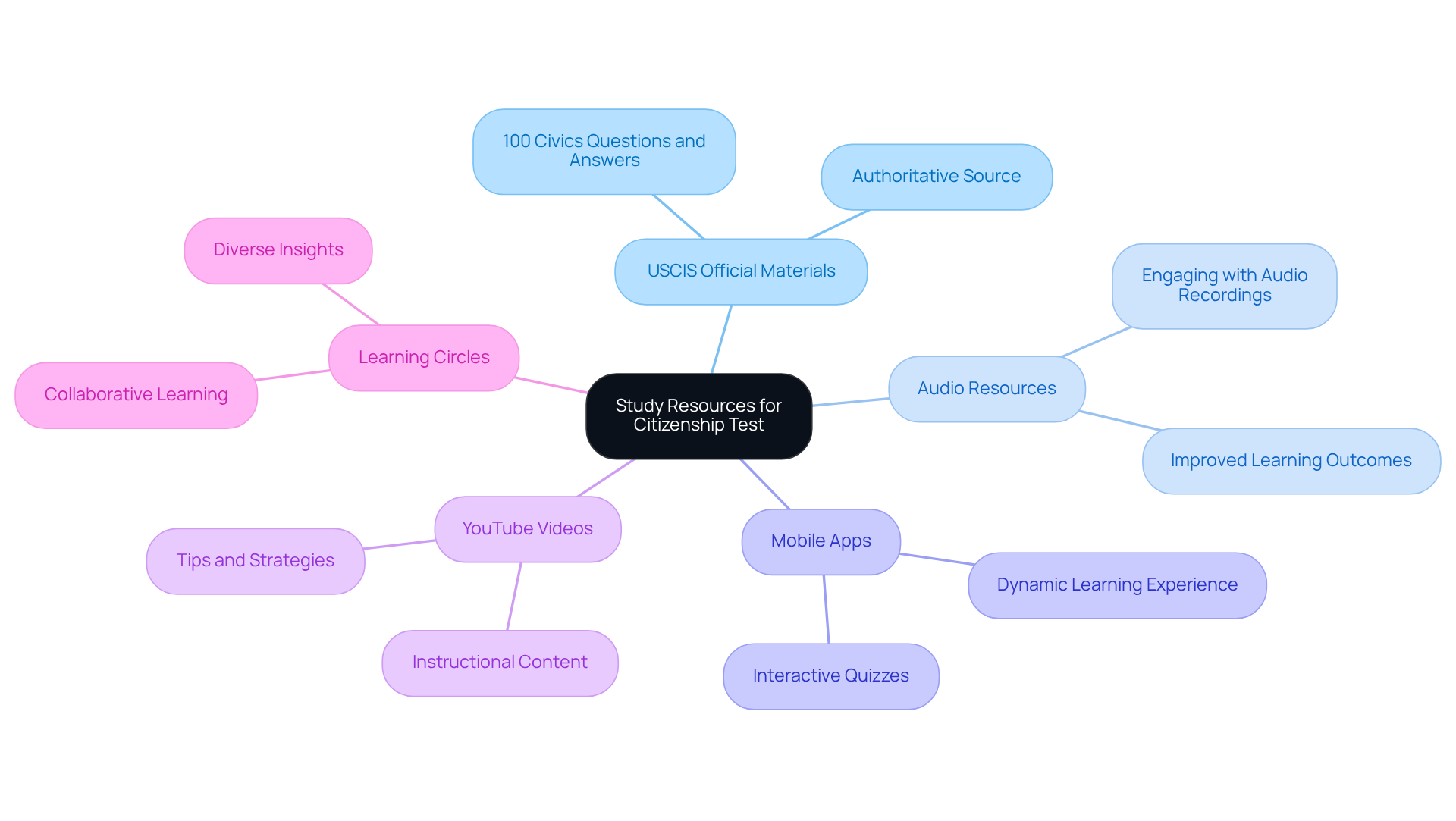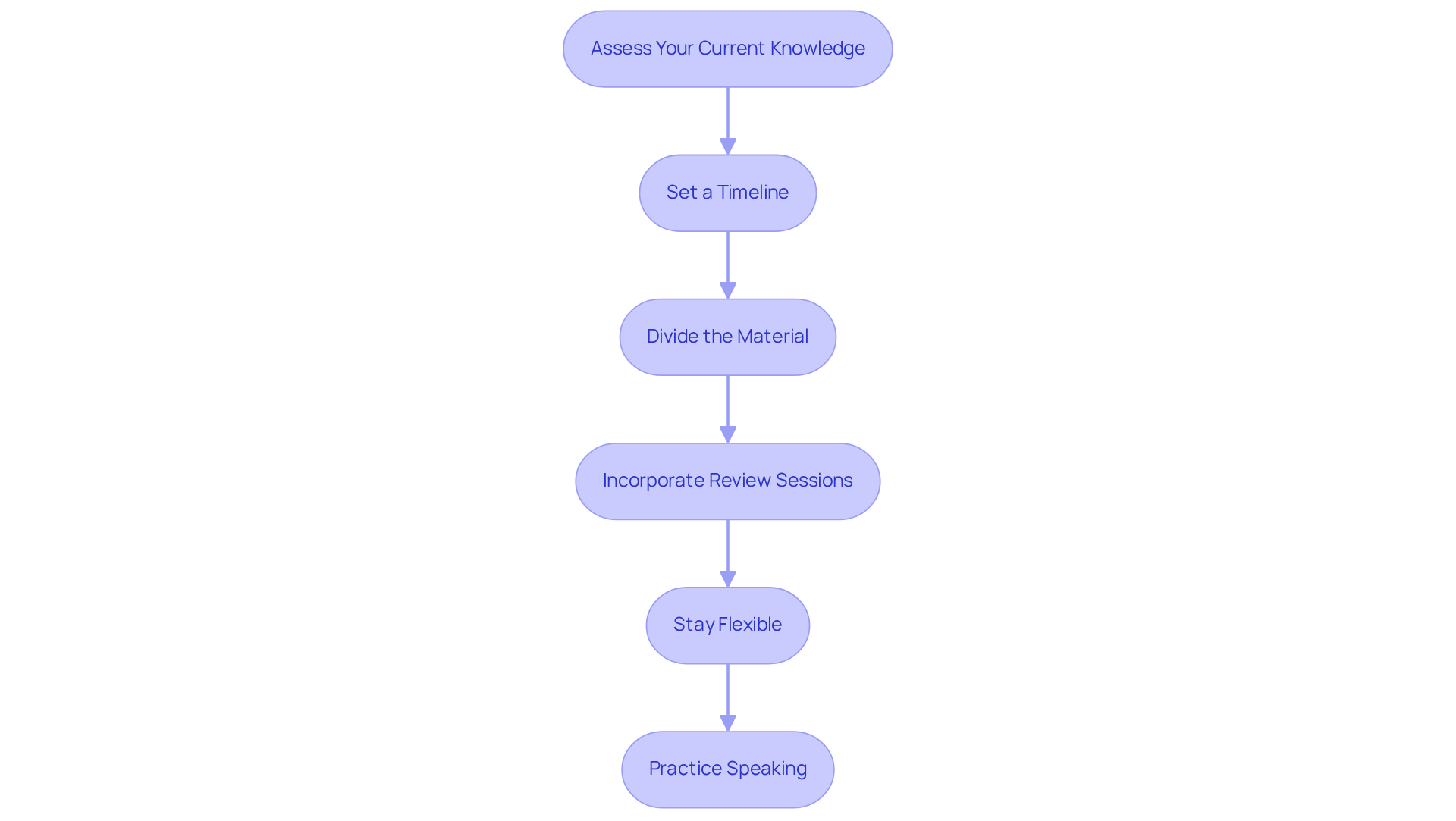Overview
This article serves as a caring guide to mastering the 100 civics questions for U.S. citizenship, offering effective strategies for your preparation journey. It's important to remember that familiarizing yourself with these questions can feel overwhelming, but there are steps you can take to make this process more manageable. By utilizing various study resources and creating a structured study plan, you can enhance your understanding and retention of the material.
You may be feeling anxious about the citizenship test, but know that these strategies can significantly increase your chances of success. Embracing a supportive approach to your studies not only prepares you for the test but also builds your confidence. Remember, you're not alone in this; many have walked this path before you and have found success through dedication and the right preparation.
As you embark on this journey, take a moment to reflect on your own experiences and challenges. With the right resources and a nurturing mindset, you can navigate this process with ease. So, take that first step today—your future awaits!
Introduction
Mastering the 100 civics questions for U.S. citizenship can feel overwhelming for many aspiring citizens. It's important to recognize that these questions cover vital knowledge about American history, government, and civic responsibilities, making thorough preparation essential for your success. Yet, with the right strategies and resources, you can transform any apprehension into confidence.
What are the best ways to approach this comprehensive test? How can you ensure that you are well-prepared to meet the evolving requirements of the citizenship process? Let's explore these together, taking one step at a time.
Understand the 100 Civics Questions for U.S. Citizenship
The , which includes , covers vital aspects of American history, government, and citizens' rights. Preparing for this significant milestone can feel overwhelming, but with the right approach, you can navigate it successfully. Here are some steps to guide you:
- Acquaint Yourself with the Inquiries: Start by accessing the official list of the from the USCIS website. This list is essential as it outlines the specific topics you need to study, helping to alleviate any uncertainty you may have.
- Comprehend the Structure: Remember, the assessment is conducted as a verbal interview, where a USCIS officer will ask you up to 10 questions from the list. To pass, you need to accurately respond to at least 6 of these items. It's encouraging to note that in FY 2022, over 88% of applicants passed the naturalization test during their initial interview, underscoring the benefits of thorough preparation.
- Focus on Key Topics: The inquiries are organized into themes, including U.S. history, government structure, citizens' rights and responsibilities, and national symbols. Understanding will provide context for each inquiry, making it easier to comprehend and remember your answers.
- Practice with Flashcards: Consider creating flashcards that display questions on one side and answers on the other. This method not only aids memorization but also allows for efficient self-testing, reinforcing your knowledge and boosting your confidence.
- Engage with Multimedia Resources: Take advantage of videos and audio materials that present the questions and answers in both English and Spanish. This can enhance your learning experience, catering to different styles and making the process more enjoyable.
As you prepare, keep in mind that the has undergone updates, with the latest changes emphasizing a broader range of topics. Future candidates should anticipate a more comprehensive assessment format, which may require additional study time. By employing these strategies, you can increase your chances of success and approach the with confidence.
Furthermore, consider seeking advice from who stress the importance of understanding the nuances of the examination. An immigration lawyer notes, "Familiarity with the civics inquiries not only assists in succeeding in the assessment but also equips applicants with understanding of their rights and duties as prospective citizens." Incorporating real-world examples of successful preparation strategies can also resonate with you. For instance, a recent case analysis highlighted a team of healthcare professionals who formed a study group, significantly enhancing their . By staying informed about changes to the civics topics, you can better prepare for the evolving criteria of the examination.

Utilize Study Resources and Audio Materials for Effective Learning
To enhance your study efforts for the , it's important to consider utilizing the following resources that can truly support you:
- : Start with the official USCIS reference guide, which includes the 100 civics inquiries and responses. This guide is the most authoritative source for your preparation, providing a solid foundation.
- Audio Resources: You may find it helpful to engage with audio recordings of the civics questions and answers, especially if you're an auditory learner. These resources can be accessed on the USCIS website or through educational YouTube channels, making them convenient for on-the-go learning. Research indicates that can significantly improve learning outcomes. Studies show that auditory learners retain information more effectively when they engage with content in this format. Expert Tetiana P. Lendiel emphasizes that the new evaluation will require candidates to respond correctly to 12 out of 20 inquiries, underscoring the significance of thorough preparation.
- Mobile Apps: Discover test preparation applications that include interactive quizzes and flashcards. Many of these apps incorporate audio elements, allowing for a dynamic learning experience that can make studying more enjoyable.
- YouTube Videos: Watching can be beneficial. Educators often share valuable tips and strategies for memorizing answers, which can significantly aid retention and boost your confidence.
- Learning Circles: Consider joining or forming learning circles with fellow applicants for naturalization. Collaborating with peers to discuss questions and answers can deepen your understanding and offer diverse insights into the material, creating a supportive community.
With the forthcoming modifications to the , it is essential to use various preparation resources, including [audio materials](https://boundless.com/blog/us-announces-major-changes-to-naturalization-civics-test), to enhance your readiness and boost your chances of success on the immigration assessment. Remember, you're not alone in this journey, and taking these steps can make a meaningful difference in your preparation.

Create a Structured Study Plan for the Citizenship Test
Creating an for can feel overwhelming, but you are not alone in this journey. Here are some thoughtful steps to guide you:
- Assess Your Current Knowledge: Start by taking a to identify the questions you know well and the areas that need more focus. As immigration consultant Martha Arias wisely notes, "Evaluating your understanding before engaging with materials ensures that you concentrate on aspects that require enhancement."
- Set a Timeline: Consider the time you have before your and develop a . Daily study sessions, even if they are brief, can be much more effective than cramming at the last minute. Remember, beginning October 20, 2025, applicants need to answer correctly to 12 out of 20 items on the U.S. , which emphasizes the importance of thorough preparation for las 100 preguntas de la ciudadanía en español.
- Divide the Material: Break the 100 items into smaller, manageable sections. For example, aim to review 10 items each week, focusing on different themes each day to deepen your understanding.
- Incorporate Review Sessions: Plan regular review sessions to revisit what you’ve previously studied. This practice not only but also builds your confidence as you progress.
- Stay Flexible: It’s important to be adaptable with your study plan. If you find certain topics particularly challenging, don’t hesitate to dedicate extra time to those areas. You’re doing great by recognizing your needs.
- Practice Speaking: Given that the examination is oral, it’s beneficial to practice responding to questions aloud. This will help you feel more comfortable with the format and improve your speaking skills.
Organized learning schedules have proven effective in preparing for the , allowing for comprehensive coverage of content while accommodating your personal learning pace. By following these steps, you can create a that incorporates las 100 preguntas de la ciudadanía en español to enhance your readiness for the citizenship test. Remember, you have the strength to succeed, and every step you take brings you closer to your goal.

Conclusion
Mastering the 100 civics questions for U.S. citizenship is a vital step for aspiring citizens, and recognizing the importance of these inquiries can significantly enrich your preparation journey. By embracing effective study strategies and leveraging available resources, you can transform what may initially feel like an overwhelming challenge into a manageable and fulfilling experience.
Throughout this article, we've outlined key strategies to support your successful preparation. These include:
- Getting familiar with the official questions
- Utilizing multimedia resources
- Crafting structured study plans
- Engaging in collaborative learning
Each approach not only aids in memorization but also fosters a deeper understanding of American civic principles, ultimately instilling greater confidence during the citizenship interview.
As the requirements for the citizenship test evolve, especially with the upcoming changes in 2025, it’s crucial to stay informed and proactive in your study efforts. Embracing a variety of resources—from official materials to interactive apps and study groups—can profoundly impact your readiness. Remember, this journey toward citizenship is not just about passing a test; it’s about gaining a deep understanding of your rights and responsibilities as a future citizen. Take these steps to empower yourself, and approach the naturalization process with confidence and determination.
Frequently Asked Questions
What is the U.S. citizenship test about?
The U.S. citizenship test covers vital aspects of American history, government, and citizens' rights, including a list of 100 civics questions.
Where can I find the official list of civics questions?
The official list of the 100 civics questions can be accessed on the USCIS website.
How is the citizenship assessment conducted?
The assessment is conducted as a verbal interview where a USCIS officer asks up to 10 questions from the list, and you need to accurately respond to at least 6 of them to pass.
What was the pass rate for the naturalization test in FY 2022?
In FY 2022, over 88% of applicants passed the naturalization test during their initial interview.
What key topics are covered in the civics questions?
The civics questions are organized into themes, including U.S. history, government structure, citizens' rights and responsibilities, and national symbols.
How can flashcards help in preparing for the civics test?
Flashcards can aid memorization by displaying questions on one side and answers on the other, allowing for efficient self-testing and reinforcing knowledge.
Are there multimedia resources available for studying the civics questions?
Yes, there are videos and audio materials that present the questions and answers in both English and Spanish, which can enhance the learning experience.
What should future candidates be aware of regarding the civics assessment?
Future candidates should anticipate a more comprehensive assessment format due to updates, which may require additional study time.
How can seeking advice from immigration attorneys help in preparation?
Immigration attorneys emphasize the importance of understanding the nuances of the examination, which can assist in succeeding in the assessment and understanding rights and duties as prospective citizens.
Can collaborative study methods improve pass rates?
Yes, forming study groups, as demonstrated by a team of healthcare professionals, can significantly enhance pass rates through cooperative education.




